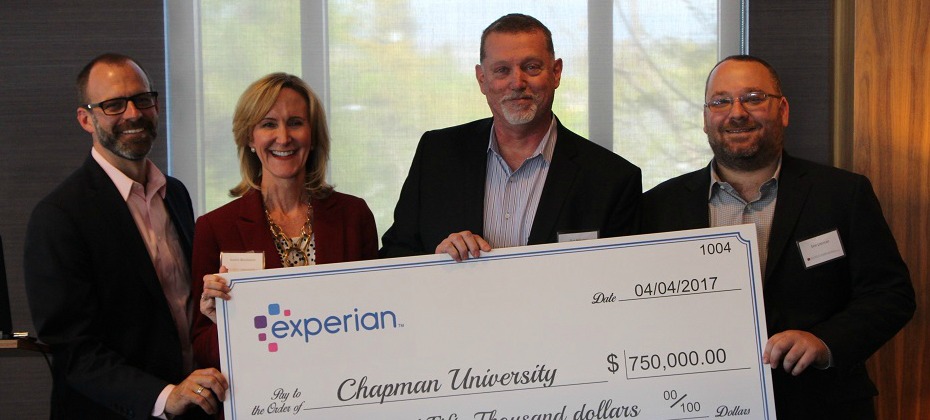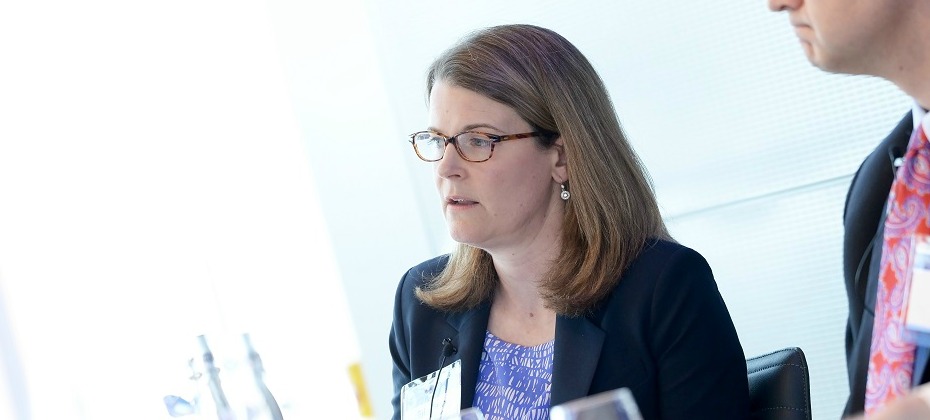Tech & Innovation

At Experian, we are continually innovating and using technology to find solutions to global issues, modernize the financial services industry and increase financial access for all.
DEI

Our deep commitment to social and financial inclusion is reflected in our workplace culture, our partnerships and our efforts to break down the barriers to financial equity.
Financial Health

Our initiatives are dedicated to getting tools, resources and information to underserved communities so that consumers can best understand and improve their financial health.
Latest Posts:

When it comes to credit for small businesses, it’s a classic chicken-and-egg situation: you can’t get credit until you have credit history, and you can’t get credit history until someone grants you credit. I know this first-hand because my own parents were small-business owners in California. My parents had built an independent insurance agency. I distinctly remember as a kid sitting in the backseat of our car and overhearing the discussions they would have about their struggles to grow the business or how they would make payroll that month. Many small businesses don’t have access to small-business loans or business credit cards, so they rely entirely on the business owner’s personal credit to make purchases. This means that while there may be a credit history for the individual, there is none for the business itself. This also means that whenever my parents needed money to get through the month, they essentially had to put their livelihood at risk because there was no separation between personal and business loans. The lack of access to funds, and the consolidation happening in the insurance industry at the time, led my parents to take another big risk – they sold the business and our house, and they liquidated their retirement accounts and put everything into a restaurant franchise. They felt there would be more stability representing an established brand owned by someone else. When I graduated from my MBA program years later, one of the things that first attracted me to Experian was the opportunity I had to ease the burdens of small business owners through my work here. The work I do really hits home, because I’m working every day to open up small-business credit, using different types of data. In today’s economy, a lot of great business ideas – profitable ones, at that – never get a chance to see the light of day simply because they don’t have the capital they need to grow. Experian is making business ideas a reality by gathering, analysing, combining and processing a breadth of new data that allows us to develop credit scores for more people and paint the most realistic picture of a situation. By verifying a business’s history, its social media accounts, its website sophistication and traffic, and customer reviews, we can measure a small business’s legitimacy, how long they’ve been operating and how they’re growing. This information, coupled with transaction data, all help determine a business’s credit worthiness and allow us to give its owners greater access to capital. Data is a huge enabler for positive change because it can give small-business owners access to credit that they wouldn’t receive otherwise. When used in the right ways, data can empower and enable small businesses to get the funding they need to hire employees, invest in their business or open a new location. In many ways, I’m helping people just like my parents.

Spring clean your credit during Financial Literacy Month with our finances in order. #FLM2017 is dedicated to teaching Americans healthy credit habits.

About a year ago, my colleague Natalia invited me to join her in a new volunteer opportunity with the Ministry of Housing in Colombia. The Ministry had created a new program called Mi Casa Ya – which means in English “My Own Home Now,” to help people in Colombia own their first homes. Excited and eager to lend a hand, Natalia and I introduced ourselves to Alejandro, the Director of the National Housing Fund at the Ministry of Housing. Alejandro told us how an unexpected roadblock threatened to derail the program. He had created Mi Casa Ya so that even the poorest people in the country could get a government subsidy to purchase a home. To get the subsidy, they just needed to qualify for a mortgage from a local bank. But that was the problem. In order to get the bank loan, applicants needed a strong credit history. Yet most of the people looking to take advantage of the subsidy through Mi Casa Ya, he explained, were considered “credit invisible.” That is, they had no viable credit history, thin or un-scoreable credit files, or they simply had bad credit. So banks had no choice but to reject them. Natalia and I heard the frustration in Alejandro’s voice, and we knew just how we could help. We told Alejandro that if the Ministry could determine which individuals were being rejected by the banks, we could come in and build credit scores for them using Experian’s data. You see, building credit histories is the sort of thing we do every day at Experian. Over the years, Experian has innovated with analyzing traditional and alternative data sources, such as public records and magazine subscriptions, to create the most accurate and realistic picture of someone’s credit. And by unlocking the power of this data, we are able to identify the data sets that can help lenders make better decisions when making loans, especially for people with thin credit files. Working with Natalia and Alejandro for Mi Casa Ya over the past year has been incredibly rewarding – and our work here isn’t done! Since I work in the legal department at Experian, I am now involved in reaching an agreement with the Ministry of Housing to help advance this project. The details are tricky and the process is tedious, but when I think about the people whose lives we have the ability to transform, I just get excited. Because of our work, many more families in Colombia will be able to fulfill their dream of owning their own homes – that’s huge.

Experian celebrates Financial Literacy Month each year to enrich financial education in America and why we have a dedicated team educating consumers.

By volunteering through Experian’s Sohos Reais – Real Dreams – project, I taught a mother of five about understanding basic business concepts so she could expand her sewing business and keep pursuing her dream. I grew up with parents who loved helping others, which fostered my love for volunteerism. Now that I work at Experian, this passion has blossomed as I’ve volunteered in many different capacities, from dressing as a clown to cheer up people in hospitals, to helping teach financial literacy to small-business owners in São Paulo, Brazil. Experian’s Sohos Reais – Real Dreams – program is designed to help connect entrepreneurs and small-business owners with experts who can advise them on how to help their business succeed. My volunteer partner, Diana, and I went through the training together, and a few months later were contacted by Aliança Empreendedora – Experian’s project partner – to help support a local entrepreneur. We were sent information about a woman named Adriana who was looking for advice for her sewing business. When we first met at Adriana’s house, she welcomed us into her home, fed us toast and black coffee, and introduced us to her five children. Adriana is a single mom whose husband left her after becoming a drug dealer. She told us how he had stopped supporting her and the children financially, and how Adriana now relied on her sewing business to support herself and the children – two of whom had serious health issues. Creating this business had been her dream since she was 12, when she had made her first dress for a school party. Now, she sewed colorful shopping bags and purses every day that she sold for R$1.25 a piece – a tiny price compared with the amount of work it took her to produce them. While she loved her job, Adriana told us that the money she made from her sales barely allowed her to cover basic living expenses, like water and electricity. She was on the brink of giving up her dream. The more we talked with Adriana, the more Diana and I realized that what she needed most was someone to help her understand basic business concepts, like cost and revenue. I thought that if we could help her control the money going out, we could solve a lot of her problems. Adriana was eager to learn, so right then and there, I showed her how, by keeping track of costs and profits, she could pay her bills and start to save money for her family. After our first meeting, a group of us from Experian were so inspired by her story that we raised R$1,415 for Adriana to buy fabric for her bags, and gave her a book to help her track her finances. Now every time we meet, Adriana brings the book with her, full of notes – she says it helps her work out her profit from the bags she sells so she knows how much more fabric she can buy. I never imagined that just sharing my financial knowledge with someone could help change their life. By volunteering with Real Dreams, Diana and I helped Adriana get back on her feet and continue pursuing her dream as a small-business owner and provider for her family.

I recently attended a conference in Alwar, India, hosted by Experian and the International Finance Corporation. During one of the sessions, I met a single mother of two who had recently moved to a rural village in India. Her husband had left her and she was hoping to pick up work as a tailor once she purchased a sewing machine to support her family. As we talked, she confided in me that she was having trouble securing a loan from microfinance institutions because she didn’t have papers to prove her identity. And since she was new to the village, no one knew who she was. Without a proven identity, she couldn’t qualify for a loan and get the money she needed to support herself and feed her children. Indian banks predominantly serve urban customers whose credit reports are extensive. However, most customers from smaller districts and rural towns – like this woman – can fit their credit history on less than a page. Identification may be the only way they can verify their character to secure a loan. As I sat with this woman, I started telling her about our Prove ID tool that I had recently helped to develop. Using an individual’s biometrics, the tool would search her credit history, bank card and any information that can prove she is who she claimed to be. I explained that by using this tool, she could now prove what village she’s from, that she was a permanent resident in her new village and that she was likely to repay her loan. She was stunned and overwhelmed. In that moment, I realized that rural clients often need human connection to clearly understand what a bank or microfinance institution requires in order to obtain a loan. Many rural customers can’t read the brochures or pamphlets sitting in a bank, but by engaging them in conversation, you can effectively educate them about how to prove their identities and build their credit profiles to successfully access the finances they need. As a Product Developer for banks, I sometimes get so caught up on how to make products run that I lose sight of how the work I do impacts the community. Helping one woman discover Prove-ID to secure a loan and provide for her family inspired me. I want to continue being more involved in my community to help others who may not be literate learn how to prove their identities so they can better support their families.

The field of data science is still in its infancy. Every day, new advancements are helping to yield more exciting results. We’re learning how data can allow cities to provide more effective services for residents, how it can help to solve vexing health riddles, and how companies can leverage data to better serve consumers. But for advancements to be achieved, collaboration between research institutions and the private sector is essential. Even more essential is ensuring that the next generation of data scientists are equipped with the latest knowledge and resources to continue to advance the field. That’s why we are excited to announce Experian’s $750,000 gift to create the Experian Assistant Professorship in Machine Learning at Chapman University, which will be used to expand machine learning opportunities at Chapman University’s Machine Learning and Assistive Technology Lab (MLAT), where Chapman researchers use big data and technology to address challenges of social significance like autism. We believe this investment is a necessary step in an ongoing commitment to ensure our Southern California community continues to fuel economic growth by ensuring that businesses like Experian have the talent to advance field of information services. The assistant professorship will be held by Erik Linstead, Ph.D., the director of the undergraduate computing programs in computer science, software engineering, and data analytics. Dr. Linstead, one of the nation’s leading authorities on big data, is also the principal investigator MLAT. Experian has learned the value of attracting data scientists with a wide degree of interests, backgrounds, and professional experiences to help assist our clients best serve consumers. Similarly, MLAT seeks to do the same. Projects that they take on range from bioinformatics and molecular biology to machine learning and artificial intelligence. Experian’s gift will help MLAT to expand their data science-focused efforts into new fields. This gift is the latest of a long series of collaborations between Chapman and Experian. Several years ago, Experian and Chapman began a partnership that involved placing graduate students training to become data scientists in internships within Experian to provide them real-world, hands on training. Since then, the partnership has blossomed to include embedding a Chapman faculty member within Experian to better ground the academic community on how data scientists work within the private sector to better shape their curriculum. We’ve also supported scholarships and programs at Chapman to ensure that the field of data science remains inclusive, diverse, and talented. Data science will inevitably continue to have a growing impact on our lives. This gift is a commitment to the future of data science and the promise of a better tomorrow that it holds. We wish a congratulations to Dr. Linstead, and look forward to a continued stream of talent emerging from Chapman to continue to advance the field and produce better outcomes for everyone. Photo of the check presentation courtesy of Christopher Simonson. Pictured (L-R): Dean of Schmid College of Science and Technology Andrew Lyon, EVP of University Advancement Sheryl Bourgeois, President of Experian Consumer Services Guy Abramo and Principal Investigator of the MLAT Lab Erik Linstead.

Spanish Translation I’m a Senior Product Manager in Experian’s Fraud and Identity Solutions department, which means I partner with data scientists to protect banks and their customers from fraud. When most people think of fraud, they envision someone trying to open a bank account in someone else’s name. However, it wasn’t until I did a series of customer visits with big banks to understand their struggles and discovered a pervasive form of fraud in the finance industry called “bust-out” fraud. In a "bust-out" fraud, an individual applies for a credit card in their own name, establishes a normal usage pattern and builds a solid repayment history. Then, when they’re ready to execute their scam, they max out all their available lines of credit from various lenders, disappear and leave the banks with the losses. Meanwhile, the money could be funneled into funding many types of organized crime, from human trafficking to drug trading and other illicit activities. What makes this type of crime all the harder to identify and catch before it occurs is that the person applying for a credit card is who they say they are. So it’s not about identity theft. To address this issue, my team and I created a solution called BustOut ScoreSM. We began by reviewing data from different banks to identify patterns where bust-outs occurred. From there, we built a score that predicts the likelihood that an individual will execute the scam — months before the scam occurs. Our clients now use this tool both when opening new accounts and as part of account management. The tool flags suspicious-looking accounts, which our team then manually reviews to evaluate if the account is truly at risk for a bust-out. If it is, we work with our clients to freeze or close out those suspicious accounts. Finding solutions to a fraud problem that hasn’t been solved is probably my favorite part of the job. I love seeing products that solve real issues affecting real people come to life — from inception to launch. Helping protect people from identity theft and fraud is what gives me purpose and meaning in my work. I am proud to use the power of data as a force for good.

There’s no arguing the importance of data to the marketing industry, but it’s equally important for marketers to leverage data in a responsible manner. On March 22, the Data & Marketing Association (DMA) held the Dynamic State of Data conference in Washington, D.C. to highlight critical public policy initiatives the industry is currently engaged in Congress and state legislatures across the country. The conference included remarks from Senator Thom Tillis (R-N.C.) and Federal Trade Commission Chairwoman Maureen Ohlhausen on their views of why data driven marketing is vital to our nation’s economic engine. Additionally, Liz Oesterle, Experian’s Senior Director for Government Affairs and Public Policy, participated in a panel discussion on the DMA’s Data Standards 2.0 initiative. The Data Standards 2.0 will tackle new high profile and emergent data issues, and update DMA’s marketing compliance standards – DMA’s Guidelines for Ethical Business Practice – focusing them to be more relevant for today’s data practices. During the panel, Oesterle outlined why industry self-regulation and the Data Standards 2.0 initiative is critical for responsible information sharing. In addition to providing business and compliance teams with certainty, Oesterle said “self-regulation helps to get in front of potential legislative and regulatory action by demonstrating to policymakers the industry is able to address any potential issues.” Stu Ingis, a Partner at Venable and DMA’s Legal Counsel, also participated in the panel. Ingis provided background on the Data Standards 2.0 initiative and discussed some of the areas in which the updates are expected to address, including cross-device tracking; data security; compliance with health and children’s data privacy; onboarding; and the Internet of Things. "Experian believes that self-regulation, like the DMA Data Standards 2.0, strengthens consumer protections, allows for responsible innovation and creates regulatory certainty,” said Oesterle. Photo courtesy of: The Data & Marketing Association


